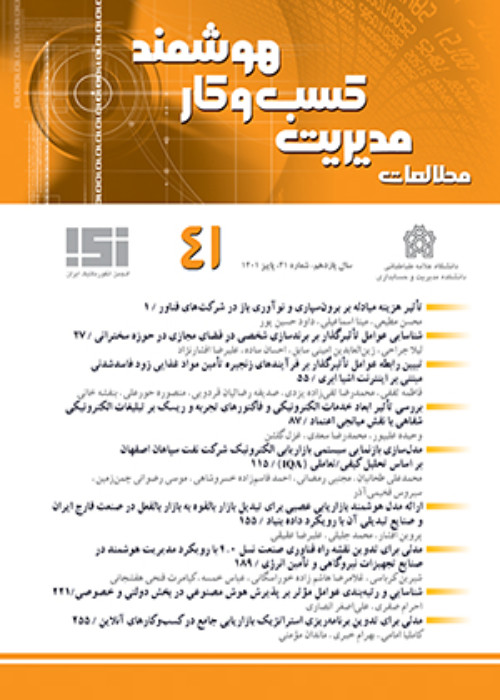Identifying the applications and requirements of using artificial intelligence in new automotive products
Artificial intelligence provides unique opportunities to improve the performance of various industries, including the automotive industry. The present study seeks to identify the applications and requirements of using artificial intelligence in new automotive products such as self-driving cars by obtaining opinions from managers and employees of domestic automotive companies through semi-structured interviews and thematic analysis. The interviewees included 11 managers and 17 employees, of which 15 had a bachelor's degree, 11 had a master's degree, and 2 had a doctorate degree. 21 codes were identified in the applications section and 26 codes were identified in the requirements section. After conducting 28 interviews, theoretical saturation was achieved. From the codes identified in the applications section, self-driving cars and voice assistants, shared transportation, and resource allocation, expert staff, and team formation can be mentioned in the requirements section. Considering the variety of artificial intelligence applications in new car products and according to the specified requirements according to the opinions of experts, the development of a suitable platform for hard and soft technologies in an integrated manner; And government support regarding the creation of legal infrastructure can improve the development path of the current technology. Of course, in order to create a context for the successful operation of artificial intelligence in the automotive industry, all the effects of its application from different cultural and social aspects should be considered with a systematic perspective.
Artificial intelligence has enormous potential to reduce the problems of automakers around the world. Nevertheless, reports show that between 2017 and 2019, the number of automobile manufacturers that consciously refrained from using artificial intelligence and related technologies such as machine learning and neural networks in the production and supply of new products such as connected and autonomous cars have done so; it has only increased from 26% to 39% (Gandhi et al., 2022).
The lack of attention to the complexities of artificial intelligence and the acceleration of the use of this technological tool have caused the failure of automobile manufacturers' plans to provide intelligent products (Fernandes et al., 2022). Despite the applications and benefits of artificial intelligence in automotive services, there are still many ambiguous aspects regarding the use cases and prerequisites that different researches have addressed from a specific perspective, and the lack of a framework consistency in this area is felt. For example, Gupta and colleagues (2021) argue in their research that cars equipped with artificial intelligence technology are not capable of evaluating and classifying their environment on their own.
The present study aims to identify applications and requirements related to the use of artificial intelligence in new automotive products, such as self-driving cars. Therefore, the results of this study can be useful to automobile manufacturers trying to revitalize the potential and improve their products in the field of using artificial intelligence.
In this regard, in order to achieve the objectives of the research, a fundamental question is posed:“What are the requirements and prerequisites for using artificial intelligence in the delivery of new products such as autonomous and connected cars"?
The applications of artificial intelligence in automotive products can be divided into two categories: personal applications and social applications. Personal applications refer to products designed with two elements of security and convenience for users in mind. These applications include cruise control, automatic parking, voice assistant, alert systems, and route suggestion systems, all of which manifest in self-driving cars (Paliotto et al., 2022). Social applications refer to products whose effects include all members of society. For example, self-driving cars and cars equipped with artificial intelligence will reduce urban congestion or reduce the need for parking. These cars also play an effective role in transporting disabled and vulnerable people. Other social applications include the role of these cars in reducing environmental pollution and shared transportation (Zhang et al).
Regarding the requirements and prerequisites for the use of artificial intelligence in modern automotive products, various researches have been carried out, among which we will cite only a few examples below:- Barzegar and Elham (2019), using a descriptive-analytical approach, the criminal liability of the user of self-driving cars in accidents was discussed.
- Demlehner et al. (2021) conducted a study to identify 20 applications of artificial intelligence in the production of intelligent and autonomous cars and to examine these applications from the two dimensions of business value and realizability.
- Othman (2022) studied the requirements for the use of artificial intelligence in automotive products, such as cruise control, warning systems and self-driving cars, and studied its consequences from the point of view security, the economy and society, etc.
This research is”an applied research”in terms of purpose and a descriptive survey in terms of data collection. The information collection method is a survey and semi-structured interview with experts. The experts include two categories of managers and senior employees from the research and development department of interior automakers who have more than five years of work experience and are familiar with artificial intelligence. In order to collect samples, semi-structured interviews were conducted with the target people in person or in person using the snowball method.
The method of data analysis in this research is thematic analysis; so, after implementing the text of the interviews and analyzing and coding it with the thematic analysis method, 21 codes were identified in the applications section and 26 codes were identified in the requirements section. After carrying out 28 interviews, theoretical saturation was reached. From the codes identified in the applications section we can refer to self-driving cars, voice assistant, and in the requirements section we can refer to resource allocation, specialized personnel.
The main goal of this research was to identify the applications and requirements related to the use of artificial intelligence in new car products, such as self-driving cars. According to the review and analysis of the interviews with the thematic analysis method, the research results were determined into two groups:In the first group, applications of artificial intelligence in new products of automobile manufacturers were identified, such as self-driving cars, cruise control and warning systems, among which, according to the interviews, self-driving cars were the most important. Therefore, in this research, emphasis was placed on identifying key applications, which were separated into two dimensions: personal and social applications; In this regard, a total of 21 applications were identified.
In the second group, the requirements and prerequisites of artificial intelligence were classified, and due to the dispersion of results in previous research, a great effort was made to integrate the requirements. In this regard, the requirements of artificial intelligence are divided into six general categories, which are: 1- road infrastructure, 2- technical infrastructure and equipment, 3- knowledge, 4- users, 5- the role of managers, 6- culture, Rules. Therefore, as far as possible, in this category, fundamental requirements such as society, individual, technology and knowledge have been taken into account.
In short, taking into account the diversity of applications of artificial intelligence in modern automotive products, it can be concluded that, according to the established requirements and opinions of experts, the development of a suitable and integrated platform of hard technologies and soft law requires serious support from the government and attention to the creation of legal infrastructure. Therefore, we suggest that policy makers and managers of the automobile industry, in order to facilitate the technological development and optimal use, and successful application of artificial intelligence in the automobile industry, should all first systematize their point of view, and pay particular attention to the necessary infrastructure and consider different dimensions such as technical, cultural, social, etc.
- حق عضویت دریافتی صرف حمایت از نشریات عضو و نگهداری، تکمیل و توسعه مگیران میشود.
- پرداخت حق اشتراک و دانلود مقالات اجازه بازنشر آن در سایر رسانههای چاپی و دیجیتال را به کاربر نمیدهد.



